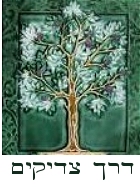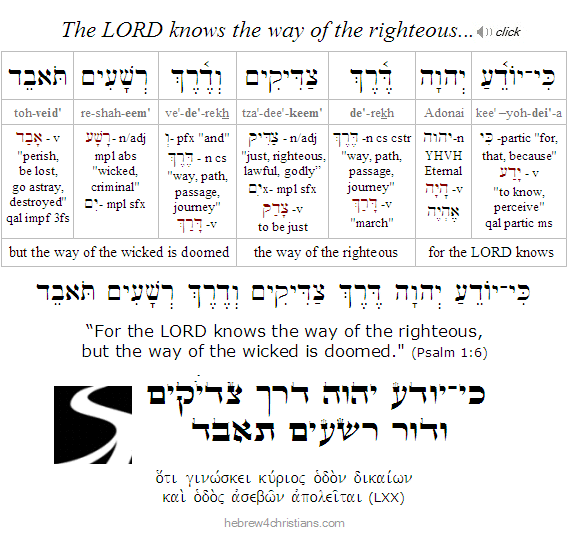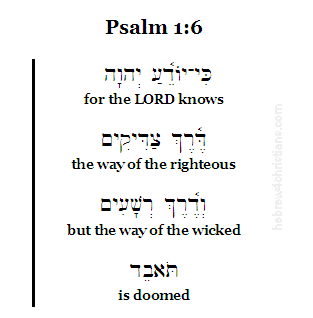|
HOW WE THINK ABOUT THINGS MATTERS. Our thoughts determine how we see, feel, interpret, reason -- and choose. In a sense, our thoughts express who we really are: they are "inner verbalizations" that reveal our character. And since our thoughts lead to feelings that are inevitably expressed in actions, our actions ultimately express what we believe (at least at any given moment in time). To change undesirable behavior, we often need to back up and detect erroneous assumptions that underlie and justify our choices. Often these assumptions operate on a "pre-conscious" level of awareness. We must slow down and ask ourselves what we are really thinking and believing whenever we consider the choices we are making. But the two are inextricably linked together: our thoughts determine our actions and our actions express our thoughts...
Psalm One stands as a sort of "preface" to the entire Book of Psalms (ספר תהילים) by first of all extolling the way of the righteous (i.e., derekh tzaddikim: דֶּרֶךְ צַדִּיקִים) in contradistinction to the way of the wicked (i.e., derekh resha'im: דֶרֶךְ רְשָׁעִים). It is therefore a foundational Psalm that is intended to encourage us to separate ourselves from the ways and customs of the prevailing godless insanity and culture (2 Cor. 6:17).
Notice that the very first verse of the very first Psalm declares that the happy or fortunate person (ashrei ha-ish) neither "walks" (הָלַךְ) in the counsel of the wicked, nor "stands" (עָמָד) in the way of sinners, nor "sits" (יָשָׁב) in the seat of the scornful:
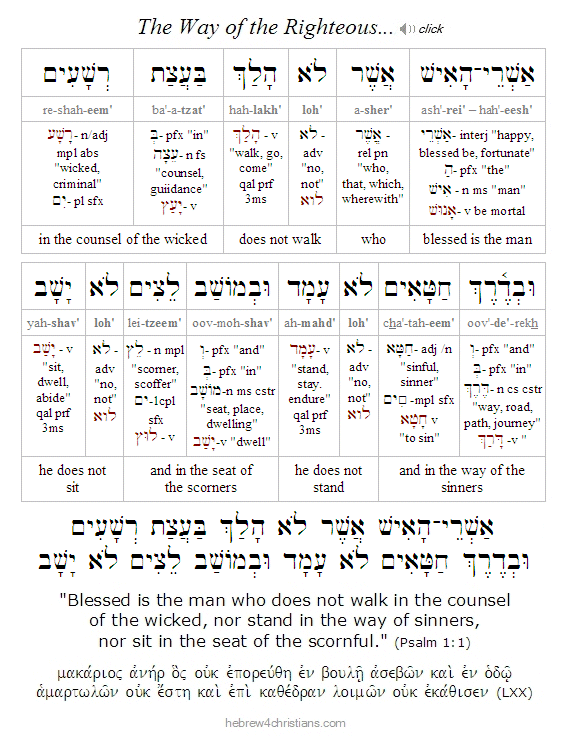 |
Although King David used parallelism in this verse, note that the verbs "walk," "stand," "sit" mark an unmistakable progression -- or rather a regression away from the upward walk of the righteous to a place of murky despair, cynicism and bitterness.... Looked at from the reverse perspective, the ungodly first heed wicked counsel and then walk in its doctrine and presuppositions. This causes them to slow down and "stand" in a sinful state (i.e., to dwell/abide in a state of ignorance). The sense of life's urgency is lost to them: there is no place to "go," no development, no "goal" or purpose to life... Finally, the wicked decide to "sit" down, or "dwell" in their misery with an abiding scorn.
Note that the righteous - the tzaddikim (הַצַּדִּיקִים) - do not "walk" in the "counsel of the wicked." In other words, since they live by a different set of axioms, they realize that the thoughts of the wicked are grounded in fallacious assumptions about reality. And since thought ultimately determines action, the repudiation of the assumptions of the wicked inevitably leads to a different lifestyle or "walk" for the righteous. This is the collision of faith between the righteous and the world system I've written about elsewhere.
Second, since the righteous man walks according to a different set of principles (i.e., the counsel of the godly), he will not be found "standing" in the way of sinners. Since the "way of sinners" (דֶרֶךְ חַטָּאִים) is essentially one of ignorance (i.e., sin [חֵטְא] is "misses the mark"), the righteous soul actively discerns and walks by the truth about reality. Such discernment often means rejecting the status quo and therefore standing apart from the crowd. This is suffering "outside the camp" of the world, the lonely place of faith that leads the righteous to separate themselves from the "groupthink" and self-deception of the crowd.
Third, because the righteous walk differently - away from the crowd - they will not be found "sitting" with the scorners. The word translated "sits" (יָשָׁב) can also be translated as "dwells." The word translated "scorner" is leitz (לֵץ), a cynic who mocks (yalitz) everything in a show of superficial superiority. The leitz is unteachable and arrogantly considers himself as better than others. The Book of Proverbs (ספר משלי) regards him as an incorrigible fool. The way of the righteous is one of humility and genuine love for others created b'tzelem Elohim (in the image of God). Sanctified speech upbuilds others and expresses good will.
We depart from the way of the righteous whenever we heed of the counsel of the wicked -- whenever we begin making their words our own by uncritically listening to them.... When we attend to various news reports from the mass media, or when we unthinkingly accept the prevarications of politicians, for example, and passively accept their distorted versions of reality, we are "taking counsel of the wicked." The same can be said regarding heeding the messages of the advertisers, of television shows, movies, popular music, medical "experts," and so on. Often the messages are subliminal and attempt to cajole us to accept alternative versions of reality... Is it any wonder that television is referred to as "programming"? Advertisers, politicians, educational psychologists, sociologists, social engineers, etc., all understand that manipulating how people think determines what they will eventually do... Getting you to uncritically accept their messages is the first step to entrapping you.
If we are not careful, we might find ourselves believing the twisted versions of reality that are passed off as being "true" in the world. If we find ourselves complaining, murmuring, or despairing over things of this world, we are seeing the evil that we are "scripted" to see, and therefore we become wicked ourselves. The "counsel of the wicked" is assimilated into our thoughts, our words, and our actions... Whom we listen to is of vital importance!
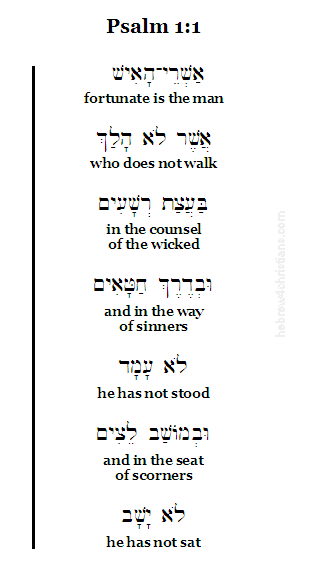 |
The way of the righteous is "faith, hope, and love" (1 Cor. 13:13). Hakarat tovah (הַכָּרַת טוֹבָה) is a Hebrew phrase that means "recognizing" or "receiving" the good, i.e., gratitude. Hakarat tovah is one of the middot ha-lev (qualities of heart) that should mark the lives of those who are grace-based and focused. Gratitude is the product of joy (i.e. chara: χαρα) obtained from the gift of being conscious of God's grace (i.e., charis: χαρις). Faith accepts that all things work together for good - gam zu l'tovah ("this too is for the good") and therefore rejects assumptions that create bitterness and anger.
The sages note that Psalm 1:1 could have been written as, "Cursed is the man who walks in the way of the wicked, who stands in the way of sinners, and who sits in the seat of the scornful," but King David took a healing approach by stating positively what needs to be corrected in our lives. Positive criticism focuses on the potential for good we see in others. Using harsh words of rebuke leads to pain and misunderstanding. Our speech needs to be sanctified -- edifying and building up hope in others (Eph. 4:29). The essence of Torah is mercy, and therefore we should always judge others (including ourselves) in the best possible light. Hakarat tovah means recognizing the good in others and choosing to see with ayin tovah (עין טובה) a "good eye."
Focusing on God - elevating our thoughts - delivers us from the path of the wicked to the realm of divine happiness. God has told us that we can escape from the pervasive counsel of the wicked by finding delight (חֵפֶץ) in the "law" (i.e., Torah, תּוֹרָה) of the LORD:
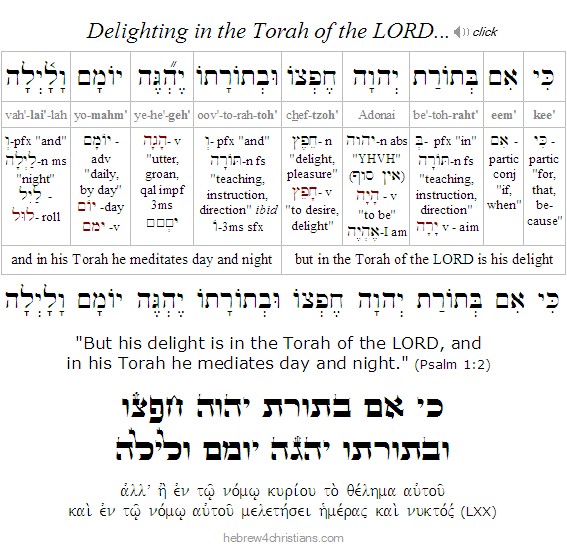 |
The truly happy person - ashrei ha-ish (אַשְׁרֵי־הָאִישׁ) finds delight in the Torah of the LORD. Note that the Hebrew word asher (אָשֵׁר) means to go straight, to walk or press on, or to make progress. Pressing on in righteousness leads us to true happiness, a state of blessedness. The "happy man" represents the ideal man of God who is not ensnared by the ways of the wickedness that surrounds him. His victory over the world is found in his faith (1 John 5:4). The way forward is the Torah-perspective.
Note further that the word "delight" is linked with the use of our tongues, which is of course directly connected with the words that verbalize our thoughts... מִי־הָאִישׁ הֶחָפֵץ חַיִּים אהֵב יָמִים לִרְאוֹת טוֹב׃ / "Who is the man who is eager for life, who desires days of good?" נְצר לְשׁוֹנְךָ מֵרָע וּשְׂפָתֶיךָ מִדַּבֵּר מִרְמָה׃ / "Guard your tongue from evil, your lips from deceitful speech" (Psalm 34:12-13). Again, our thoughts/words determine our character, which in turn are expressed in our actions. Listening to the truth, filling our hearts with God's word, setting our affections on heavenly reality, thinking on worthy things -- all are remedies for the clamor and chatter and fallacies so prevalent in our world today. Consciously heeding to the message of God's truth elevates us from the morass of disinformation, propaganda, and deception that is used to control and manipulate the crowd.
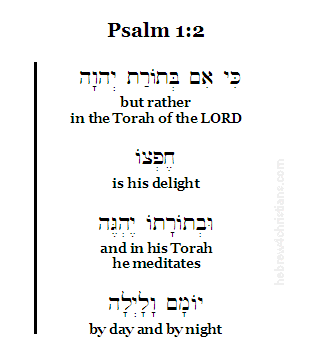 |
Psalm One closes with a great prophecy: כִּי־יוֹדֵעַ יהוה דֶּרֶךְ צַדִּיקִים וְדֶרֶךְ רְשָׁעִים תּאבֵד / "For the LORD knows the way of the righteous, but the way of the wicked is doomed":
We are reponsible for what we believe and how we live. Who we listen to matters; how we think matters. Many of us have become so conditioned and influenced by the world that we don't even realize we are under its spell! Refuse the counsel of the wicked; do not heed the propaganda and messages of those who attempt to instill fear within you. There is no fear in God's love, and God's love and glory fills the earth (Isa. 6:3)! Take every thought captive to the obedience of Messiah. Walk in His love (Eph. 5:2); stand in His truth (Eph. 6:14), and dwell in His promises (Eph. 1:20; John 15:4-10). For the LORD is our Teacher and we are his students. So let us work hard to obtain a Torah perspective on life! Amen!
וּבָרוּךְ שֵׁם כְּבוֹדוֹ לְעוֹלָם
וְיִמָּלֵא כְבוֹדוֹ אֶת־כּל הָאָרֶץ
אָמֵן וְאָמֵן
oo·vah·rookh · shem · ke·voh·doh · le·oh·lahm
ve·yee·ma·lei · khe·voh·doh · et-kohl · ha·a'·retz
a·men · ve·a·men

"Blessed is His glorious name forever;
His glory fills the whole world.
Amen and Amen"
(Psalm 72:19)
Psalm 1 Hebrew Study Reader
I have written a Psalm 1 study page for students of Biblical Hebrew that I hope will be helpful. The Hebrew text is given for each verse, with Hebrew grammatical helps listed as footnotes (see reader link below). A separate table is provided at the end listing the Hebrew vocabulary used in the Psalm. My goal is to help people learn to fluently read the Hebrew text without relying on interlinear helps...
|


